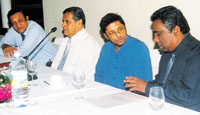| Only
22 % of criminal cases get a conviction
Among the main reasons for the breakdown in law and order is that the three main institutions in Sri Lanka - the parliament, the judiciary and the Police have failed miserably since independence. "The concept
of rule of law is one of the fundamental principles, significantly
present in a democracy and guaranteed through the constitution.
But the three institutions that deal with this have failed,"
argued Kalinga Indatissa, Secretary, Bar Association, at the monthly
meeting of The Sunday Times Business Club last week. Indatissa said that a major setback in this country was the failure of the legislature to identify national policy in the economy, police and judiciary. Legislators failed to carry out research when they wanted to pass a law. Lack of social duties by some lawyers, lack of enthusiasm of complainants and lack of knowledge from the police contributed to criminals being freed in court (due to lack of evidence). "If criminals retain good lawyers, they can escape punishment," he noted. With normal law became the exception and the country being ruled under emergency regulations for many years, police became ignorant of their normal duties, mainly the public relations aspect, as they were involved in protecting border villages and VIPs. He also blamed the media for distorting the news and being partly responsible for the situation, saying it was important to report facts and present the truth. Indatissa said
that civil society made the fundamental mistake of leaving the decisions
of national importance in the hands of politicians who got a blurred
vision of what was happening. He urged the business community to
play a bigger role. Tom Ellawala, Chairman C.W. Mackie and head of a Ceylon chamber sub-committee on Law and Order, spelled out the work they were involved in at the chamber and the attempts made to defuse the impact on business. The main cause for rising crimes was the free use of illegal firearms and lawlessness in industrial establishments with politicized trade union activities. He said armed forces deserters committed most of the crimes. Chandra Fernando, senior DIG (Research and Planning) Police, said that the free use ofillegal firearms was due to the civil unrest that prevailed in the country for the last 25 years and accepted that a majority of the violent crimes were committed by army deserters who number 53,000. He said that according to an analysis of statistics there appeared to be no increase in the crime rate, but he didn't discount the possibility of a rising number of "dark figures" - crimes not reported to the police. He said it was the responsibility of civil society to report crimes and these complaints should be carried through in court. He said that when the risk is more, the crimes are low and taking this into consideration, police have increased patrolling and requested local authorities to minimize the "environmental" opportunities such as darkness by lighting the roads, etc. Fernando said that out of the number of crimes reported only 22 percent got a conviction in court while others were either withdrawn, settled or just went by as concerned parties lost interest due to long delays in the legal process, lawyers getting postponements and police accused of fabricating evidence. He accepted that the police were not doing their duties as they have been acting under Emergency Regulations for the last 2 ½ decades. Independence was important to do their duty properly, he noted, adding that he expected the Police Commission to ensure this much needed independence. Police have drawn up an action plan to restore the lost public image and confidence and are developing model police stations at Narahenpita and Kirillapone where people are provided with hotlines to contact them round the clock, 24 hours a day. Fernando said that information on the hotlines would be advertised shortly in the form of posters in and around the area. Blaming each other - lawyers blaming police and police blaming everybody - was apparent from the discussion and comments from the audience. Moderating the discussion, Feizal Samath, Business Editor, The Sunday Times noted that this country would be a brighter place if the "blame game" was stopped and all sections of society worked together to address the most critical issues in Sri Lanka. Cargills
show healthy profits, turnover "In the processed meat operation, our strategy of high quality and affordable price has helped boost volumes two-fold over the previous year," the company said in a statement to shareholders. The launch of Cargills Magic Dairy ice cream helped to grow the ice cream industry and wrested market share from the competition. During the period under review, Cargills invested Rs 220 million capital assets including the expansion of the Food City and the acquisition of the Bairaha supermarket chain. Further strategic investments - 100 percent stake in CPC Agrifoods Ltd and CPC Lanka from Unilever and buying back the 26.3 percent stake held by Lanka Ventures Ltd in a subsidiary which manages the KFC restaurants - have made the group a strong contender in the food and beverage industry, the statement said adding that the board of directors expect significant returns from these investments. |
||||
Copyright © 2001 Wijeya Newspapers
Ltd. All rights reserved. |
